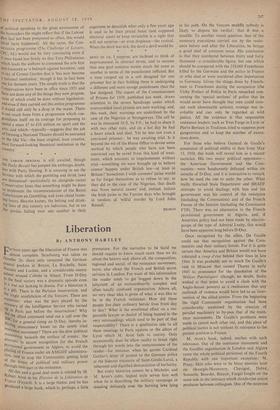MOST OF US, I suppose, are inclined to think of
imprisonment in abstract terms, and to assume that one gaol sentence means much the same as another in terms of the punishment inflicted. But a man cooped up in a cell designed for one prisoner but in fact holding three is undergoing a different and more savage punishment than the law designed. The report of the Commissioners of Prisons for 1958, published last week, draws attention to the severe handicaps under which overcrowded local prisons are now working; and, this week, their warnings are underlined by the case of the Nigerian at Strangeways. The cell he was in measured 10 ft. by 8 ft.; he had to share it with two other men, and on a hot day he had a heart attack and died. Yet he was not even a convicted prisoner : he was awaiting trial. Is it beyond the wit of the Home Office to devise some method by which people who have not been convicted can be saved from this kind of treat- ment, which amounts to imprisonment without trial—something we were brought up to believe cannot happen under British law—at least in Britain? Sometimes I wish coroners' juries would so far forget themselves as to refuse to say, as they did in the case of the Nigerian, that death was 'from natural causes' and, instead, imitate the Irish juries in the Famine days who brought in verdicts. of 'wilful murder by Lord John Russell.'
PHAROS














































 Previous page
Previous page